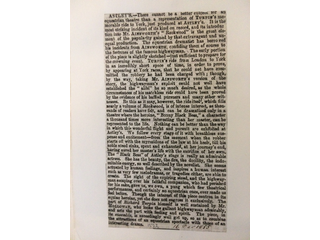Transcription
ASTLEY’S.—There cannot be a better subject for an equestrian theatre than a representation of TURPIN’S memorable ride to York, just produced at ASTLEY’S. It is the most striking incident of its kind on record, and its introduction into Mr. AINSWORTH’S “Rookwood” is the great element of the popularity gained by that extravagant and unequal production. The equestrian dramatist has borrowed his incidents from AINSWORTH, confiding them of course to the fortunes of the famous highwayman. The early portion of the piece is slightly sketched—just sufficient to prepare for the crowning event. TURPIN’S ride from London to York in an incredibly short space of time, in order to prove, by appearing at York races, that he could not have committed the robbery he had been charged with; through, by the way, taking Mr. AINSWORTH’S version of the story, the highwayman’s exploit could not well have established the “alibi” he so much desires, as the whole circumstances of his matchless ride could have been proved by the evidence of his baffled pursuers and many other witnesses. Be this as it may, however, the ride itself, which fills nearly a volume of Rookwood, is of intense interest, as thousands of readers have felt, and can be dramatized only in a theatre where the heroine, “Bonny Black Bess,” a character a thousand times more interesting than her master, can be represented to the life. Nothing can be better than the way in which this wonderful flight and pursuit are exhibited at Astley’s. We follow every stage of it with breathless suspense and excitement—from the moment when the robber starts off with the myrmidons of the law at his heels, till his noble steed sinks, spent and exhausted, at her journey’s end, having saved her master’s life with the sacrifice of her own. The “Black Bess” of Astley’s stage is really an admirable actress. She has the beauty, the fire, the docility, the indomitable energy so well described by the novelist. She seems actuated by human feelings, and inspires a human interest such as very few melodramas, or tragedies either, are able to create. The sight of the expiring steed, and the highwayman escaping over his faithful companion, who had perished for his sake, gave us, we own, a pang which few theatrical performances, and certainly no equestrian ones, ever made us feel before. Though the interest of this piece centres in its equine heroine, yet she does not engross it exclusively. The part of Richard Turpin himself is well sustained by Mr. HOLLOWAY, who looks the gallant highwayman admirably, and acts the part with feeling and spirit. The piece, in its ensemble, is exceedingly well got up, so as to combine the attractions of an equestrian spectacle with those of an interesting drama.
